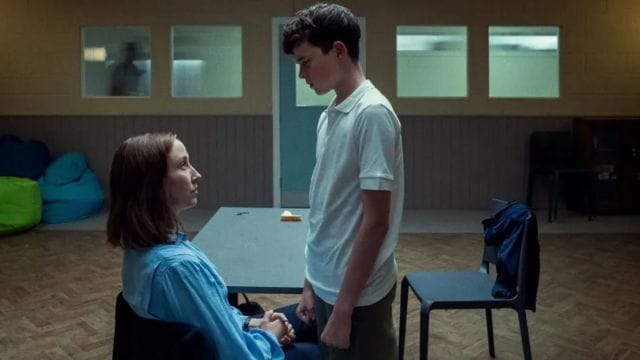
In his 13th year, my son receives a T-shirt with graffiti on it: “I am an interesting person”. Written beneath, in a bolder font, a single word: “Online”. I am an interesting person. Online.
I insist it is untrue. He is a funnier person in real life, more annoying surely, but kind, gentle, if infuriatingly argumentative, I say. He refuses to rise to the bait. It is a gift that has struck a chord. He has only recently been initiated into social media and already he seems at home with its circadian rhythms. Every weekend, he spouts names of new games; apps and widgets flower on the home screen whose functions I have to Google to keep up. We run through the safety checks, negotiate the what and who with and for how long — and trust him to listen to us. We tamp down frissons of anxiety and hope we are doing enough.
I think back to this as I watch the final, gut-wrenching episode of Stephen Graham and Jack Thorne’s limited series on Netflix, Adolescence. Eddie and Amanda Miller, parents to 13-year-old Jamie, sit in their room, wondering where they might have gone wrong. Their son is incarcerated in a juvenile detention centre, awaiting trial for the murder of a classmate, a girl he has stabbed seven times because she made him feel inadequate; their lives are upended by all the signs they saw but couldn’t read. “Did we make him?” they ask each other. “Should we have done more…?” asks Eddie in agony. “I think it’d be good if we accepted that maybe we should have done,” his wife responds.
Should we have done more? Could we have done more? Did we take our eyes off the ball a little bit? Is there a way to make it better? Did we make him so? These are difficult questions to answer in hindsight. But these answers are not necessarily online. In a world that has so much advice for girls and women, the template for masculinity has remained disturbingly fixed across cultures — a game of one upmanship in which an emasculation of the loser seems to be the only right answer. Men like Andrew Tate might be the flag bearers of the global manosphere and its toxic masculinity but it’s hard to ignore the more insidious home-grown variants, offline. “Don’t cry like a girl,” boys are told; “chudiyan pehni hai kya (are you wearing bangles)?” they are taunted. The crossover into the shadowy realm of “locker bois” and deepfakes, double-entendre emojis and alpha males in love or loathing with themselves seem only a step away. In this hierarchy, women are always pegged lower, more a sexualised fantasy, a conquest, less of a companion. In this world, anger and loneliness go hand in hand.
In the final scene, Eddie steps into Jamie’s room, trying to find remnants of a childhood he hadn’t known was in the past. The space-themed wallpaper, the teddy bear on the bed, the drawings on the wall speak of the “gormless” little boy far removed from the teenager who had turned his loneliness and hurt into a weapon: “I’m sorry son, I should’ve done better,” Eddie says.
Perhaps, he could have. Perhaps, it might still not have made a difference. Or, perhaps, like the Sheenagh Pugh poem, it might have saved them all: “Sometimes our best efforts do not go/ amiss, sometimes we do as we meant to./ The sun will sometimes melt a field of sorrow/ that seemed hard frozen: may it happen for you”.
Adolescence is a difficult time. But it need not be lonely. For a generation adrift on the world wide web, there’s one thing that we have going for us. Our capacity to smother in love. There’s comfort in the knowledge that sometimes we know our boys, still not fully formed, better than themselves — the frailties they won’t admit to, the quiet strengths they are yet to realise. Every day, there are parts of them that recede further and further away from us as they become their own person. But the face of the young adult will always be familiar, like a warm hug after a hard day.
paromita.chakrabarti@expressindia.com